This op-ed was originally published by East Asia Forum.
COVID-19 is fast-tracking the declining relevance and effectiveness of a rules-based global trading system—one already buckling under the stress of a myriad of factors including the rise of China and the turn inward by the United States.
For the United States in particular, the pandemic is amplifying the sense that trade—especially with China—creates unacceptable dependencies and risk. Calls for the repatriation of supply chains and restrictions on investment in key industries are on the rise. China concerns also underlie calls by some to disregard global rules and leave or abolish the World Trade Organization (WTO).
For others, the pandemic underscores the need for cooperation to address a host of unprecedented global challenges. It has brought into focus the vacuum left in the absence of U.S. leadership, and the critical need for the United States to play the role of reviving an international order, one that balances opportunities with assurance that gains are distributed fairly.
The COVID-19 pandemic could not have come at a worse time for an international trading system already at a crossroads. In fact, what happens next could lead to the renewal of globalization or its unraveling. While the Trump administration’s all-out antagonism toward the WTO is the latest nail in the coffin, China’s long history of unfair trading practices has put the mere existence of the system at risk.
Globalization—the interconnectedness of goods, services, people, and ideas—is supported by international trade rules that provide consistency and predictability. These rules, embodied by the WTO, are not a system for global governance or hyper-globalization. They encourage cooperation through nondiscriminatory treatment for the cross-border movement of goods and services—$19 trillion of goods trade in 2019 alone—and support economic growth that has generated enormous benefits globally and for the United States. The trade rules do not infringe on U.S. sovereignty in the ways critics decry—the United States remains free to do as it chooses. While there are costs for noncompliance with WTO commitments, such as trade retaliation, these costs figure into compliance with the rules.
WTO principles, including nondiscrimination, the application of predictable tariff rates, and reliance on the rule of law to settle trade disputes, have become accepted norms. Despite political pressures, these norms have largely endured the 2008 global financial crisis and more recently the COVID-19 pandemic in that we haven’t yet seen a repeat of the beggar-thy-neighbor policies of the 1930s.
But large cracks in these longstanding norms, including recent export restrictions on health care products, are part of a bigger picture of rising trade barriers. The WTO has also been unable to address these challenges or keep pace with new areas of trade, and is hamstrung by its consensus-based decisionmaking, stalled negotiations, and distrusted dispute settlement system.
More fundamentally, however, the failure of WTO rules to effectively constrain China’s trade practices has undermined confidence in the institution. Perceptions of WTO complicity in China’s rise at the expense of the United States are further heightening sentiments questioning it and the global system. Supply chain disruptions and shortages of key products like personal protective equipment during COVID-19—China controls 50 percent of the market—have highlighted the consequences of U.S. economic interdependence with China and sown additional doubts over the virtues of the system.
U.S. withdrawal from the WTO, however, will not fix the problem. The United States stepping away from its role as guarantor of the international trading regime is also not productive. Such a strategy only provides fewer mechanisms to address challenges, including those created by China.
A reconstituted system that meets the needs of global cooperation in the pandemic’s aftermath would be better realized under U.S. direction. Rather than destroying what has taken U.S. leadership 75 years to forge, the United States must continue building. Bolstering WTO norms, like nondiscrimination, predictable tariffs, and the rule of law, that allow global commerce to flourish is a start. This will take bold ideas and strong U.S. leadership.
First, a U.S.-led “big bang” reform of global trade rules is needed. The WTO needs to be overhauled and not through the limited incremental reform efforts underway. The times call for visionary, realistic thinking about a fresh set of rules developed among like-minded countries. Progress requires U.S. leadership that builds on what works and strengthens WTO norms. Any new trading system needs to work to the benefit of all participating countries—including effectively addressing the China challenge.
Second, the United States should negotiate trade deals that set the bar for international emulation. It should return to the policy of selectively seeking comprehensive agreements with similarly ambitious countries to supplement a multilateral strategy. Managed trade frameworks like the U.S.–China “phase one deal” and narrow political bargains, such as those with Japan, Brazil, and India, undermine U.S. leverage to address significant trade barriers. The United States is better served pursuing agreements to build on and expand WTO rules with like-minded countries, particularly those whose domestic systems and underlying values align. Such arrangements would raise standards globally and could incentivize China and others to participate more responsibly.
Lastly, the United States needs to get its own house in order. A hard “reset” should be hit on the conversation around trade and a focus on policies enhancing competitiveness. It should start with an honest debate about the costs and benefits of different approaches to international trade—clearly identifying wider implications for the U.S. economy, opportunities abroad, and the winners and losers. A country’s approach to trade should be shaped by informed decisions and smart policy choices, not misleading rhetoric.
The Brookings Institution is committed to quality, independence, and impact.
We are supported by a diverse array of funders. In line with our values and policies, each Brookings publication represents the sole views of its author(s).
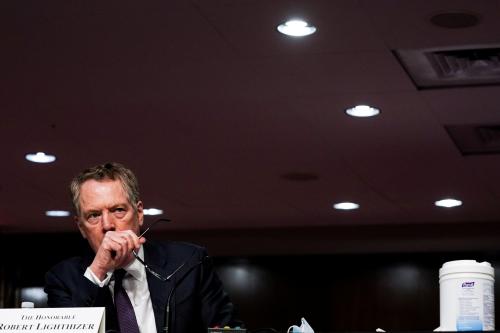
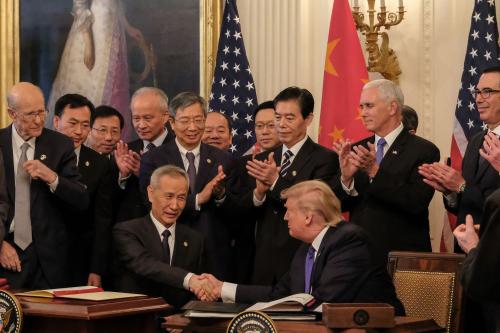

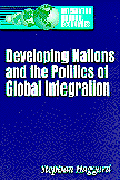

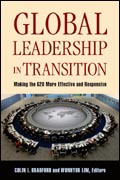

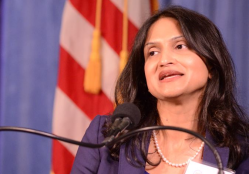


Commentary
Op-edRestoring US trust in globalization
September 2, 2020